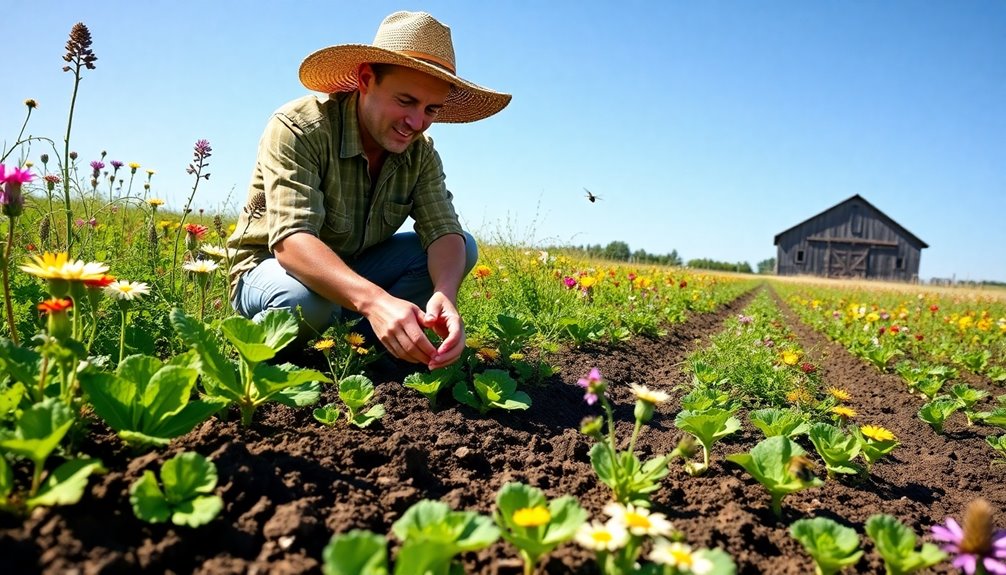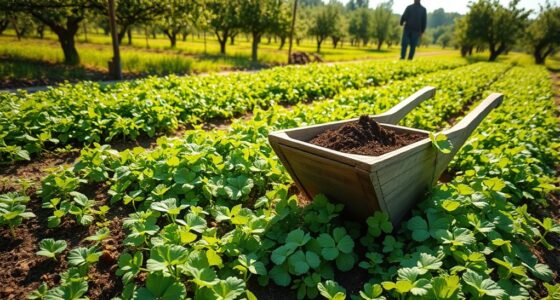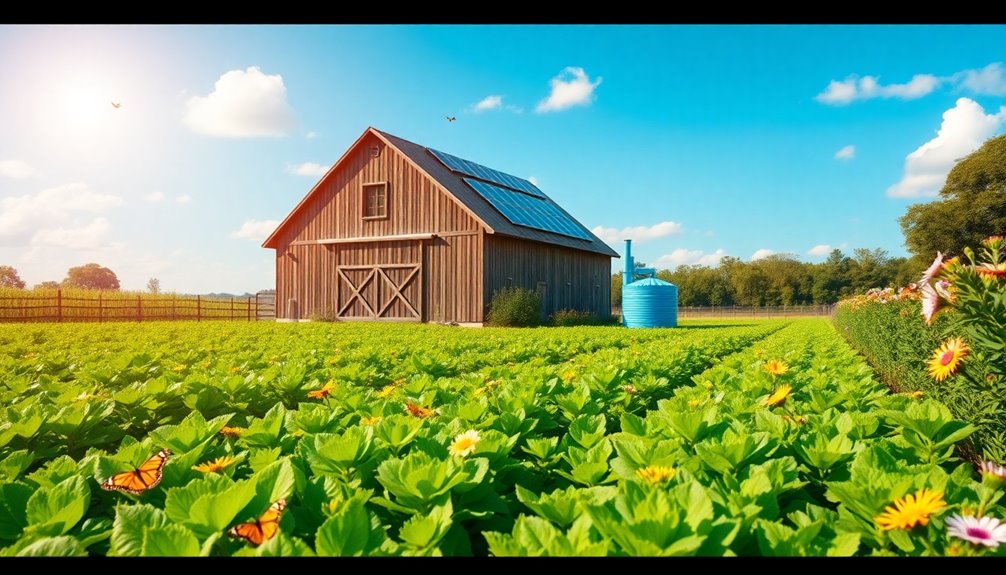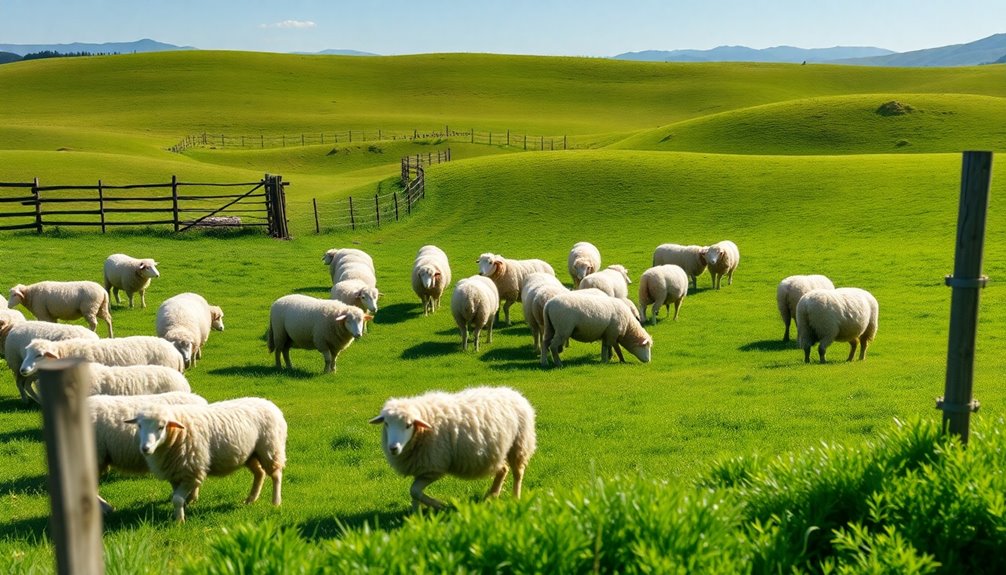To start your small farm business, plan carefully and set a realistic budget, covering equipment, seeds, feed, and labor. Choose durable, versatile tools to minimize long-term costs, and consider leasing or buying second-hand. Research market opportunities and explore organic certification if relevant. Track expenses and income diligently, seeking grants or support when needed. If you keep these steps in mind, you’ll be better prepared to grow a profitable farm—more tips lie ahead.
Key Takeaways
- Conduct detailed planning and budgeting to ensure sustainability, profitability, and alignment with farm goals.
- Select durable, versatile equipment suited to your farm size and crop or livestock needs, exploring leasing or second-hand options.
- Understand organic certification requirements and incorporate related costs into your financial plan from the outset.
- Track ongoing expenses and revenues meticulously, identifying diverse income streams like markets, CSA, or direct sales.
- Research grants, loans, and support programs, and develop a comprehensive business plan to attract investment and manage finances effectively.

Thinking about starting a small farm business? The first step is planning and budgeting carefully to ensure your venture is sustainable and profitable. You’ll need to weigh the essential farm equipment that will help you run your operations smoothly. From tractors and plows to irrigation systems and hand tools, investing in the right farm equipment can considerably boost efficiency. Prioritize versatile, durable tools that match your farm’s scale and the crops or livestock you plan to raise. Remember, quality equipment might cost more upfront but will save you money in repairs and replacements over time. It’s also wise to explore leasing options or second-hand equipment to keep expenses manageable as you get started.
Start your small farm with essential, durable equipment and consider leasing or second-hand options to save costs.
Another critical aspect of planning your small farm business is understanding the requirements for organic certification if you aim to grow organic produce. Organic certification can open up premium markets and attract customers willing to pay higher prices for organic products. To achieve this, you need to familiarize yourself with the standards set by certifying agencies, which often include specific rules about soil management, pest control, and the use of organic inputs. Planning your farm layout and crop rotations with organic principles in mind from the beginning will save you time and money later. Securing organic certification involves initial inspections and ongoing compliance, so it’s essential to budget for these costs and incorporate them into your overall financial plan.
Budgeting for your small farm also means accounting for ongoing expenses like seeds, feed, labor, utilities, and maintenance. Keep detailed records of your expenditures and revenue projections to help you stay on track. Consider potential income streams and market opportunities, such as farmers’ markets, local grocery stores, or CSA programs, to ensure your farm can generate steady cash flow. As you plan, don’t forget to set aside funds for unexpected costs, equipment upgrades, or emergencies. Having a clear, realistic budget not only guides your purchasing decisions but also provides a roadmap for growth and expansion down the line. Additionally, understanding affiliate marketing opportunities can help you diversify your income sources and promote your farm products effectively. Exploring market research methods can help you identify the most profitable crops and products for your specific region.
Finally, it’s essential to research grants, loans, or government programs that support small farmers. These resources can provide crucial funding or technical assistance, easing the financial burden as you start. By thoroughly planning your farm equipment needs, understanding the certification process, and creating a detailed budget, you lay a solid foundation for your small farm business. Focus on building a sustainable operation from the outset, and you’ll be better equipped to navigate the challenges and reap the rewards of farming. Being aware of grocery savings strategies can help you reduce operational costs and maximize your profitability as your farm grows. Additionally, developing a strong business plan will guide your decisions and attract potential investors or lenders. Incorporating efficient general ledger coding into your financial management practices can help you track expenses accurately and ensure compliance with financial regulations, further supporting your farm’s financial health.
Frequently Asked Questions
How Do I Choose the Right Crops or Livestock for My Farm?
To select the right crops or livestock, consider your climate, market demand, and available resources. Conduct soil testing to understand nutrient levels and determine suitable crops. Practice crop rotation to improve soil health and reduce pests. Select livestock that fit your farm’s size and capabilities. By analyzing these factors, you’ll make informed decisions that ensure sustainable growth and profitability for your farm.
What Legal Permits and Licenses Are Required to Start a Small Farm?
Imagine your farm as a blank canvas, and the rules are the vibrant colors you must use. You’ll need to check zoning regulations to guarantee your land allows farming activities. Additionally, environmental permits might be necessary to protect local ecosystems. These permits help you stay compliant and avoid future hurdles. Before starting, visit local government offices or their websites to gather all required licenses, making your farm a harmonious part of the community.
How Can I Access Funding or Grants for My Farm Startup?
To access funding or grants for your farm startup, you should research government grants available for agricultural projects and consider private funding options like investors or farm credit programs. You can also explore local and national programs that support new farmers. Applying for these grants and funding sources involves preparing a solid business plan and demonstrating how your farm benefits the community and environment. Stay proactive and persistent in pursuing these opportunities.
What Are Common Mistakes to Avoid in Farm Planning?
You should avoid neglecting detailed farm planning, like overlooking costs for essential farm equipment or irrigation systems. Failing to plan for these can lead to unexpected expenses and operational delays. Don’t assume everything will go smoothly; instead, create a thorough plan that includes equipment needs, water management, and budget allocation. This proactive approach helps prevent costly mistakes and ensures your farm runs efficiently from the start.
How Do I Develop an Effective Marketing Strategy for My Farm Products?
To develop an effective marketing strategy, you should focus on building strong branding strategies that reflect your farm’s unique qualities. Use social media to reach your target audience, share your farm’s story, and showcase your products. Consistent messaging and engaging content help you connect with customers and build loyalty. Also, consider local markets and partnerships to expand your reach. With these tactics, you’ll attract more buyers and grow your farm business successfully.
Conclusion
Starting a small farm business is like planting a seed—you need careful planning and steady effort to see it grow. By budgeting wisely and setting clear goals, you’ll turn your passion into a thriving venture. Remember, patience and persistence are key, just like nurturing a crop through changing seasons. Keep your eyes on the prize, stay adaptable, and soon you’ll reap the rewarding harvest of your hard work. You’ve got this—your farm’s bright future awaits!










